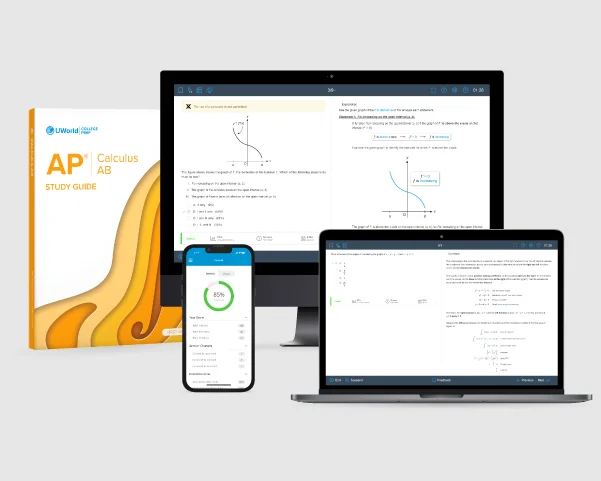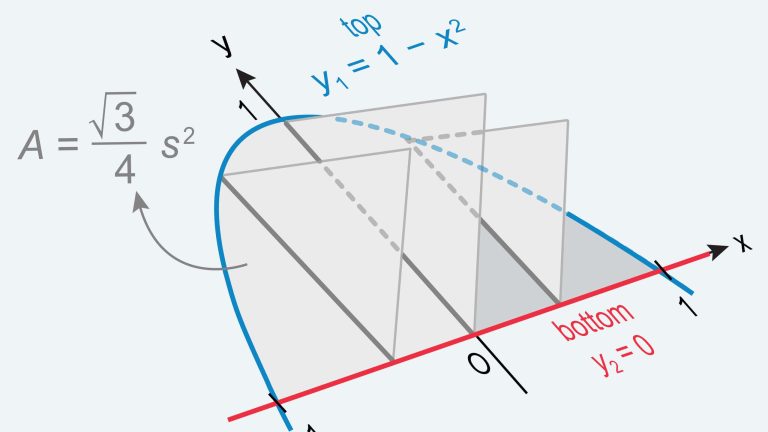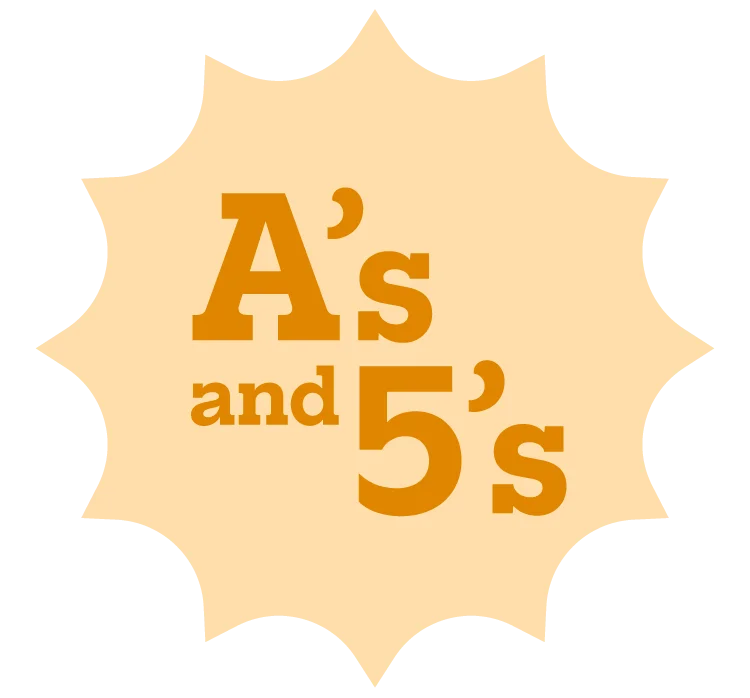Self-studying AP® Calculus AB can be daunting, but with UWorld's comprehensive resources, you can master the subject independently. This guide will walk you through a step-by-step approach to build a strong foundation, tackle complex topics, and ace the AP exam.
Step 1: Building a Foundation with the UWorld AP Calculus AB Study Guide
The first step in mastering AP Calculus AB is gaining a solid understanding of the basics. UWorld’s study guide is designed to break down complex topics into easy-to-digest sections, making it perfect for beginners and those revisiting core concepts.
-
Visual-Rich Content for Better Comprehension:
Calculus is a highly visual subject, relying on graphs, functions, and derivatives. UWorld’s study guide includes diagrams and illustrations to help you understand concepts like limits, continuity, and differentiation. The visual aids make abstract concepts more concrete, giving you a clear starting point. -
Up-to-Date, Well-Organized Information:
UWorld keeps its content current, aligning with the latest AP Calculus AB curriculum. The guide is structured in a logical sequence, taking you from the basics to more advanced topics, so you won’t feel lost. This organization helps you build confidence by mastering each concept before moving on to the next. -
Flexible Access:
Available in both digital and physical formats, UWorld’s study guide allows you to study anywhere. If you’re reading at home, you might prefer the physical copy; on the go, the digital format lets you continue seamlessly. This flexibility supports a smooth, uninterrupted study experience. -
Avoiding Overload:
The guide is comprehensive yet designed not to overwhelm you with unnecessary details. Focus on each section, absorb the key points, and jot down questions or concepts you want to revisit. By working through the study guide, you’ll develop a strong foundation in AP Calculus AB, making it easier to tackle complex topics later on.
Step 2: Deepening Your Understanding with UWorld’s Video Explanations
Once you’ve gained a basic understanding from the study guide, some topics might still feel challenging. Calculus can require more than just reading to grasp fully, especially when it comes to topics like integrals, the Fundamental Theorem of Calculus, and applications of derivatives. This is where UWorld’s videos become essential.
-
Concise, Bite-Sized Lessons:
UWorld’s videos are short and designed to focus on a single topic at a time. Each video allows you to concentrate on one area without feeling overwhelmed by a lengthy lecture. You can pause, rewind, and replay these videos as often as needed, working at your own pace to master each concept. -
Visually Engaging Format:
The videos use graphics and animations to clarify complex topics, making abstract calculus concepts more accessible. Whether it’s seeing a derivative come to life on a graph or understanding the area under a curve through animations, these videos can make a big difference in your comprehension. -
Learn from Experienced Instructors:
UWorld’s videos are taught by knowledgeable instructors who simplify challenging topics in a clear, conversational tone. They often provide helpful analogies or shortcuts that make learning calculus feel like a personal tutoring session.
Step 3: Testing Your Knowledge with UWorld’s Practice Questions
After building a foundational understanding and tackling challenging topics with video explanations, it’s time to test your knowledge. UWorld’s AP Calculus AB practice questions are designed to mimic the complexity and format of the AP exam, giving you a realistic testing experience.
-
Exam-Level Practice Questions:
UWorld’s questions are created with the AP exam in mind, so they cover the types of questions you’ll encounter on test day. By practicing with these questions, you’ll gain familiarity with the format and difficulty level, reducing surprises and boosting your confidence. -
Detailed Explanations for Each Answer:
UWorld provides explanations for both correct and incorrect answers. This feedback helps you understand not only why one answer is right, but also why others are wrong, which is critical for mastering calculus concepts and learning from mistakes. -
Review and Track Your Progress:
After each set of questions, you can review your performance and focus on areas where you need more practice. If you find yourself struggling with certain question types—such as those involving optimization or related rates—return to the study guide or videos for a refresher, then reattempt similar questions until you feel confident.
Step 4: Reinforcing Learning with Custom Flashcards and Study Notes
One of the biggest challenges of self-study is retaining what you’ve learned over time. Without a teacher or regular class structure to keep you accountable, creating your own notes and flashcards can be invaluable for reinforcement.
-
Create Digital Flashcards for Key Concepts:
Use a digital tool like Quizlet, Anki, or even UWorld’s built-in flashcard feature to create cards for key terms, formulas, and processes. Flashcards help with retention by allowing you to review key information regularly, making it easier to recall on test day. -
Summarize and Synthesize Information:
Take time to write summaries of each topic in your own words after studying it. Condense complex ideas into simple language, which reinforces your understanding and gives you a valuable review tool when it’s time to study for the exam. Organize your notes by topic and highlight any areas that need further review. -
Set Up a Regular Review Schedule:
Consistent review is crucial in calculus, as concepts build on each other. Dedicate a few minutes each day or week to go over your flashcards and notes. This will help you retain information and ensure that you’re keeping pace with your study goals.
Making Self-Study Successful: Tips for Staying Accountable and Motivated
Self-studying for AP Calculus AB requires discipline, especially when you don’t have the structure of a classroom or peers for support. Here are some strategies to help you stay on track and motivated throughout your preparation:
-
Set Clear Goals and Break Them Down:
Create a roadmap for your AP Calculus AB preparation. Set weekly goals—such as finishing a certain number of chapters, watching specific videos, or completing practice questions. Breaking down your goals into manageable tasks makes it easier to stay consistent. -
Use a Planner to Track Your Progress:
A study planner, whether digital or physical, helps you visualize your progress and keep track of what you’ve covered. Note each topic you study, record practice scores, and highlight areas you need to revisit. This organization provides a sense of accomplishment as you see how much you’ve completed. -
Reward Yourself for Milestones:
Self-study can feel isolating, so give yourself small rewards for hitting milestones. For instance, reward yourself with a break, a treat, or some time on a favorite activity after completing a challenging chapter or reaching a practice score goal. Rewards help maintain motivation and make studying more enjoyable. -
Find Community Online:
While self-study means you’re studying independently, there are numerous online forums and study groups dedicated to AP Calculus. Joining a community like Reddit’s AP Calculus forum or other online platforms can give you access to helpful resources, answer questions, and provide a sense of connection with others studying for the same exam.
Conclusion
Studying for AP Calculus AB on your own may seem challenging, but with a structured approach and the right tools, it’s entirely possible. Start with UWorld’s study guide to lay a solid foundation, use video explanations to deepen your understanding, practice with exam-level questions, and reinforce learning with personalized notes and flashcards. By following this approach and staying organized, you can not only master AP Calculus AB but also gain valuable self-study skills that will serve you well in future academic pursuits.
With consistency, motivation, and the structured support of UWorld’s resources, self-study can be just as effective—and even more flexible—than traditional classroom learning. Embrace this journey, and soon you’ll find that self-study has prepared you well for the AP Calculus AB exam.





